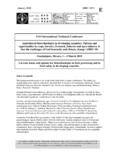Transcription of DESCRIPTION OF THE FOOD SAFETY SYSTEM IN …
1 1 DESCRIPTION OF THE food SAFETY SYSTEM IN HOTELS AND HOW IT COMPARES WITH HACCP STANDARDS. Stephanie M. Fletcher MPH , Satnarine R. Maharaj , FFPHM, Kenneth James , MPH Running title- food SAFETY in Jamaican hotels and the HACCP Standards 1. Master of Public Health. North East Regional Health Authority, Ministry of Health, Ocho Rios St. Ann. 2. Fellow of the Faculty of Public Health Medicine. University of the West Indies, Mona Campus, Department of Community Health and Psychiatry, Kingston 7, Jamaica 3. Lecturer/ Coordinator, MPH Programme; University of the West Indies, Mona Campus, Department of Community Health and Psychiatry, Kingston 7 Jamaica Address all correspondences to Stephanie Fletcher, Clay Ground District; Bamboo , St. Ann. Jamaica. E-mail address: Paper presented at Annual Educational Conference of the Jamaica Association of Public Health Inspectors, 2007, Montego Bay, Jamaica; NEHA AEC& Exhibition, 2008,Tucson, Arizona, USA.
2 2009 International Society of Travel Medicine, 1195-1982. Journal of Travel Medicine, Volume 16, Issue 1, 2009, 35 41 2 food SAFETY in Jamaican Hotels and the HACCP Standards ABSTRACT Background: Tourism is an important earner of Foreign exchange in Jamaica; hence the protection of the visitors health is very important. A study of travellers to Jamaica in 1996 1997, found that Traveller s Diarrhoea (TD) affected almost 25% of visitors. The Ministry of Health (Jamaica) initiated a program for the prevention and control of TD aimed at reducing attack rates from to over a 5-year period, through environmental health and food SAFETY standards of hotels. This paper examines the food SAFETY Systems in Jamaican hotels located in a popular resort area, to find out how comparable they are, with the HACCP strategy. Methods: A cross sectional study was done of Hotels in St. Mary and St. Ann. Quantitative data was obtained from food and beverage/sanitation staff and Qualitative data through in-depth interviews with hotel managers.
3 Observation of the food SAFETY operations was also done. Results: Majority (75%) of larger hotels used a combination of HACCP and MoH food SAFETY strategies (p= ), and offered all inclusive services (r= , p= ). Larger hotels were more likely to have a better quality Team approach, HACCP plan, monitoring of critical control points and more likely to receive higher scores (p< ). More than two thirds of hotel staff was knowledgeable of HACCP. Significantly smaller hotels ( ) received less than 70% in over all score (r= , p= ). Identification of CCPs and Monitoring of CCPs explained of the change in the overall HACCP scores (p= ). Hotel Managers felt that some hotel s SYSTEM was comparable with HACCP and that larger properties were ready for Mandatory implementation. 3 Conclusions: While some components of the HACCP SYSTEM was observed in larger hotels, there were serious shortcomings in its comparison.
4 Mandatory implementation of HACCP, would require sector specific policies be developed for smaller hotels and implemented on a phased basis. 4 INTRODUCTION Many environmental and demographic changes in developing regions of the world have resulted in outbreaks of food -borne pathogens and many re-emerging and newly identified food -borne pathogens. These vary from climatic changes, changes in microbial and other ecological systems, poor environmental sanitation and decreasing freshwater supplies resulting in outbreaks of disease such as Gastroenteritis, Hepatitis A and others transmitted by food and/or drinking water. (1) Mass tourism and huge international trade in food is causing food -borne pathogens to spread transnationally. The Caribbean is one of the most tourism dependent regions in the world, hence the need for healthy and sustainable operating systems to ensure a profitable hospitality industry and tourisms growth.
5 (2) Several studies have found that diarrhoeal illnesses are affecting travelers. In 1998, Travel Weekly reported that of 63% of persons who experience illness while traveling, 35% classified their symptoms as gastro-intestinal. MacLaurin quoting from Cheung et al (2000) suggests that 17% of 100 UK citizens reported food -borne illnesses while traveling internationally within the last 5 years. She also went on to say that 35% of 290 international air travelers had suffered from food -borne illnesses; quoting from Delgado s (2000) study, she also reported that 38% of a sample of 200 German and UK Vacationers had experienced food -borne illnesses while traveling. (3) 5 Steffen et al (1996-1997) found that of tourists suffered from Travellers Diarrheoa during their stay in Jamaica. (4) food and/or water which can be contaminated with enteric pathogens therefore require that host countries make every effort to ensure that hotels and restaurants serving food to the population and the tourism sector, apply safe food -handling and environmental sanitation practices.
6 (5, 6) The HACCP SYSTEM The General Principles of food Hygiene describes the Hazard Analysis Critical Control Point (HACCP) SYSTEM as a science based systematic approach which identifies specific hazards and measures for their control to ensure the SAFETY of food . Initially conceived as a way to provide astronauts with foods of the highest level of quality, HACCP has been adopted by PAHO and the World Health Organization (WHO), the United States food and Drug Administration, and many other agencies worldwide for the preparation of safe foods at all levels: home, restaurant, and the hotel industry. The HACCP SYSTEM is based on seven principles,, as follows: Principle 1: Conduct a hazard analysis. Principle 2: Determine the Critical Control Points (CCPs). Principle 3: Establish critical limit(s). Principle 4: Establish a SYSTEM to monitor control of the CCP. Principle 5: Establish the corrective action to be taken when monitoring indicates that a particular CCP is not under control.
7 Principle 6: Establish procedures for verification to confirm that the HACCP SYSTEM is working effectively. Principle 7: Establish documentation concerning all procedures and records appropriate to these principles and their application. 6 Significant hazards for individual food products are identified after reviewing all the processing steps and scientific information related to the processing of that food . The steps at which these hazards can be controlled ( Critical Control Points) are identified, and critical limits, such as processing and cooling temperatures and holding times, are set at key process steps. Monitoring procedures are implemented for each Critical Control Points, to evaluate conformance with these critical limits, and in the event that they fall outside these limits, pre-determined corrective actions are taken to prevent the potentially defective product from entering the market. The HACCP SYSTEM also relies heavily on verification and documentation to ensure that food SAFETY has not been compromised during any step.
8 HACCP therefore provides a structure for assessing risks or whatever could go wrong, and putting the requisite controls in place to minimize such risks. (7) Before HACCP can be implemented, pre-requisite programmes such as good hygienic practices, staff training and documented standard operating procedure should be well established. HACCP s effectiveness relies upon the knowledge and skills of both management and staff. (7) Taylor quoting from Holt (1999) pointed out that the most important factor driving the implementation of HACCP is the employment of experienced, technically qualified persons. (8) While flexibility appropriate to the business is important, all seven principles must be applied in the HACCP SYSTEM . This takes into account the nature and size of the operation, including the human and financial resources, infrastructure, processes, knowledge and practical constraints.
9 The seven principles can be applied in businesses regardless of size and the nature of the operations. (7,9) 7 The efficacy of the SYSTEM relies heavily upon the relevant HACCP knowledge and skills, management commitment and understanding of HACCP along with changes in attitude and organizational culture all requiring adequate training to overcome barriers related to human resources. (9) Failure to adhere to HACCP has been seen to be behaviour-related, however it is more wide spread where there is a lack of policy and legislation to ensure compliance and standardization for the SYSTEM , as exists in Jamaica and Ireland. (10, 11) There is increasing evidence that whilst HACCP use is widespread in large food operations its use is limited within smaller companies. In the larger food establishments, implementation is mainly motivated by customer demand, market pressure, commitment to self development and sometimes to meet licensing/certification regimes and surveillance programmes (11) The Jamaican Situation In Jamaica, food SAFETY is a priority programme of the Ministry of Health.
10 Each hotel is expected to identify hazards and establish Critical Control Points (CCPs) for monitoring food SAFETY standards based on a manual of standards and acceptable practices developed by the Ministry of Health and the Tourism Product Development Company Limited to guide the process. (12) A food SAFETY SYSTEM based on HACCP was implemented in hotels in Jamaica in 1996, however, the extent of its use in this sector is uncertain, and the knowledge, attitude and practices of hotel staff is critical to the further implementation of the SYSTEM throughout the tourist industry. 8 The Ministry of Health s Hotel Surveillance SYSTEM captures information on selected health conditions amongst travellers to Jamaica, which includes data about gastrointestinal symptoms from guests and staff. The data for guests is calculated based on the number of guest nights stayed per week. The inclusion criteria for the hotel surveillance SYSTEM is that hotels must have 100 or more rooms , serve at least three or more meals on a buffet daily.





